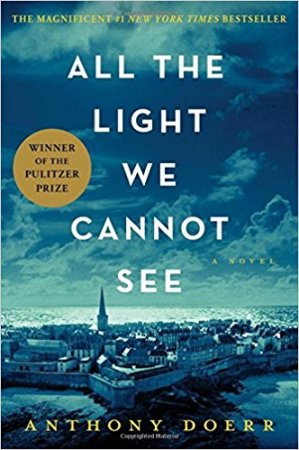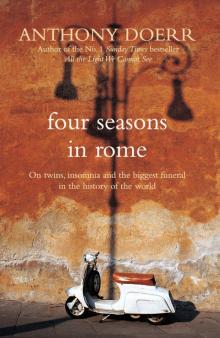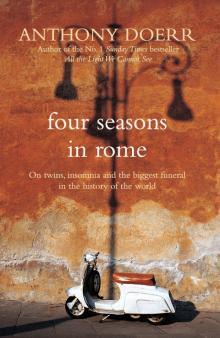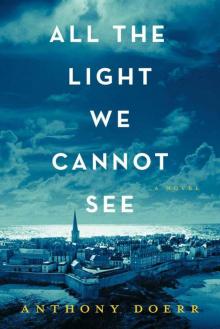- Home
- Anthony Doerr
All the Light We Cannot See Page 32
All the Light We Cannot See Read online
Page 32
be louder still.
What mazes there are in this world. The branches of trees, the filigree of roots, the matrix of crystals, the streets her father re-created in his models. Mazes in the nodules on murex shells and in the textures of sycamore bark and inside the hollow bones of eagles. None more complicated than the human brain, Etienne would say, what may be the most complex object in existence; one wet kilogram within which spin universes.
She places the microphone into the bell-shaped speaker of the electrophone, switches on the record player, and the plate begins to spin. The attic crackles. In her mind she walks a path in the Jardin des Plantes, the air golden, the wind green, the long fingers of willows drifting across her shoulders. Ahead is her father; he extends a hand, waiting.
The piano starts to play.
Marie-Laure reaches beneath the bench and locates the knife. She crawls along the floor to the top of the seven-rung ladder and sits with her feet dangling and the diamond inside the house in her pocket and the knife in her fist.
She says, “Come and get me.”
Music #2
Beneath the stars over the city, everything sleeps. Gunners sleep, nuns in a crypt beneath the cathedral sleep, children in old corsairs’ cellars sleep in the laps of sleeping mothers. The doctor in the basement of the Hôtel-Dieu sleeps. Wounded Germans in the tunnels below the fort of La Cité sleep. Behind the walls of Fort National, Etienne sleeps. Everything sleeps save the snails climbing the rocks and the rats scurrying among the piles.
In a hole beneath the ruins of the Hotel of Bees, Werner sleeps too. Only Volkheimer is awake. He sits with the big radio in his lap where Werner has set it and the dying battery between his feet and static whispering in both ears not because he believes he will hear anything but because this is where Werner has left the headphones. Because he does not have the will to push them off. Because he convinced himself hours ago that the plaster heads on the other side of the cellar will kill him if he moves.
Impossibly, the static coalesces into music.
Volkheimer’s eyes open as wide as they can. Straining the blackness for every stray photon. A single piano runs up scales. Then back down. He listens to the notes and the silences between them, and then finds himself leading horses through a forest at dawn, trudging through snow behind his great-grandfather, who walks with a saw draped over his huge shoulders, the snow squeaking beneath boots and hooves, all the trees above them whispering and creaking. They reach the edge of a frozen pond, where a pine grows as tall as a cathedral. His great-grandfather goes to his knees like a penitent, fits the saw into a groove in the bark, and begins to cut.
Volkheimer stands. Finds Werner’s leg in the darkness, puts the headphones on Werner’s ears. “Listen,” he says, “listen, listen . . .”
Werner comes awake. Chords float past in transparent riffles. “Clair de Lune.” Claire: a girl so clear you can see right through her.
Volkheimer says, “Hook the light to the battery.”
“Why?”
“Do it.”
Even before the song has stopped playing, Werner disconnects the radio from the battery, unscrews the bezel and bulb from the dead field light, touches it to the leads, and gives them a sphere of light. At the back corner of the cellar, Volkheimer drags blocks of masonry and pieces of timber and shattered sections of wall out of the rubble, stopping now and then only to lean over his knees and catch his breath. He stacks them into a barrier. Then he pulls Werner behind this makeshift bunker, unscrews the base of a grenade and yanks the pull cord to ignite the five-second fuse. Werner sets one hand over his helmet, and Volkheimer throws the grenade at the place where the stairwell used to be.
Music #3
Von Rumpel’s daughters were fat, roiling little babies, weren’t they? Both of them always dropping their rattles or rubber pacifiers and tangling themselves in blankets, why so tortured, little angels? But they grew! Despite all his absences. And they could sing, especially Veronika. Maybe they weren’t going to be famous, but they could sing well enough to please a father. They’d wear their big felt boots and those awful shapeless dresses their mother made for them, primroses and daisies embroidered along the collars, and fold their hands behind their backs, and belt out lyrics they were too young to understand.
Men cluster to me
like moths around a flame,
and if their wings burn,
I know I’m not to blame.
In what might be a memory or a dream, von Rumpel watches Veronika, the early riser, kneel on the floor of Marie-Laure’s room in the predawn darkness and march a doll in a white gown alongside another in a gray suit down the streets of the model city. They turn left, then right, until they reach the steps of the cathedral, where a third doll waits, dressed in black, one arm raised. Wedding or sacrifice, he cannot say. Then Veronika sings so softly that he cannot hear the words, only the melody, less like the sounds made by a human voice and more like the notes made by a piano, and the dolls dance, swaying from foot to foot.
The music stops, and Veronika vanishes. He sits up. The model at the foot of the bed bleeds away and is a long time restoring itself. Somewhere above him, the voice of a young man starts speaking in French about coal.
Out
For a split second, the space around Werner tears in half, as though the last molecules of oxygen have been ripped out of it. Then shards of stone and wood and metal streak past, ringing against his helmet, sizzling into the wall behind them, and Volkheimer’s barricade collapses, and everywhere in the darkness, things scuttle and slide, and he cannot find any air to breathe. But the detonation creates some tectonic shift in the building’s rubble, and there is a snap followed by multiple cascades in the darkness. When Werner stops coughing and pushes the debris off his chest, he finds Volkheimer staring up at a single sheared hole of purple light.
Sky. Night sky.
A shaft of starlight slices through the dust and drops along the edge of a mound of rubble to the floor. For a moment Werner inhales it. Then Volkheimer urges him back and climbs halfway up the ruined staircase and begins whaling away at the edges of the hole with a piece of rebar. The iron clangs and his hands lacerate and his six-day beard glows white with dust, but Werner can see that Volkheimer makes quick progress: the sliver of light becomes a violet wedge, wider across than two of Werner’s hands.
With one more blow, Volkheimer manages to pulverize a big slab of debris, much of it crashing onto his helmet and shoulders, and then it is simply a matter of scrabbling and climbing. He squeezes his upper body through the hole, his shoulders scraping on the edges, his jacket tearing, hips twisting, and then he’s through. He reaches down for Werner, his canvas duffel, and the rifle, and pulls them all up.
They kneel atop what was once an alley. Starlight hangs over everything. No moon Werner can see. Volkheimer turns his bleeding palms up as though to catch the air, to let it seep into his skin like rainwater.
Only two walls of the hotel stand, joined at the corner, bits of plaster attached to the inner wall. Beyond it, houses display their interiors to the night. The rampart behind the hotel remains, though many of its embrasures along the top have been shattered. The sea presents a barely audible wash on the other side. Everything else is rubble and silence. Starlight rains onto every crenellation. How many men decompose in the piles of stone before them? Nine. Maybe more.
They make for the lee of the ramparts, both of them staggering like drunks. When they reach the wall, Volkheimer blinks down at Werner. Then out at the night. His face so dusted white he looks like a colossus made of powder.
Five blocks to the south, is the girl still playing her recording?
Volkheimer says, “Take the rifle. Go.”
“And you?”
“Food.”
Werner rubs his eyes against the glory of the starlight. He feels no hunger, as if he has rid himself forever of the nuisance of eating. “But will we—?”
“Go,” says Volkheimer again. Werner looks at
him a last time: his torn jacket and shovel jaw. The tenderness of his big hands. What you could be.
Did he know? All along?
Werner moves from cover to cover. Canvas bag in his left hand, rifle in his right. Five rounds left. In his mind he hears the girl whisper: He is here. He will kill me. West down a canyon of rubble, scrambling over bricks and wires and pieces of roof slates, many of them still hot, the streets apparently abandoned, though what eyes might track him from behind shattered windows, German or French or American or British, he cannot say. Possibly the crosshairs of a sniper center on him this very second.
Here a single platform shoe. Here a fretwork wooden chef on his back, holding a board on which remains chalked today’s soup. Here great tangled coils of barbed wire. Everywhere the reek of corpses.
Crouching in the lee of what was a tourist gift shop—a few souvenir plates in their racks, each with a different name painted on the rim and arranged alphabetically—Werner locates himself in the city. Coiffeur Dames across the street. A bank with no windows. A dead horse, attached to its cart. Here and there an intact building stands without its window glass, the filigreed trails of smoke grown up from its windows like the shadows of ivy that have been ripped away.
What light shines at night! He never knew. Day will blind him.
Werner turns right on what he believes is the rue d’Estrées. Number 4 on the rue Vauborel still stands. Every window on its facade has been broken but the walls are hardly scorched; two of its wooden flower boxes hang on.
He is right below me.
They said what he needed was certainty. Purpose. Clarity. That pigeon-chested commandant Bastian with his grandmother’s walk; he said they would strip the hesitation out of him.
We are a volley of bullets, we are cannonballs. We are the tip of the sword.
Who is the weakest?
Wardrobe
Von Rumpel wobbles before the mighty cabinet. Peers into the old clothes inside. Waistcoats, striped trousers, moth-chewed chambray shirts with tall collars and comically long sleeves. Boys’ clothes, decades old.
What is this room? The big mirrors on the wardrobe doors are spotted black with age, and old leather boots stand beneath a little desk, and a whisk broom hangs from a peg. On the desk stands a photograph of a boy in breeches on a beach at dusk.
Beyond the broken window hangs a windless night. Ashes swirling in starlight. The voice filtering through the ceiling repeats itself . . . The brain is locked in total darkness, of course, children . . . And yet the world it constructs . . . lowering in pitch and warping as the batteries die, the lesson slowing as though the young man is exhausted, and then it stops.
Heart galloping, head failing, candle in one hand, pistol in the other, von Rumpel turns again to the wardrobe. Big enough to climb inside. How did such a monstrous thing ever get up to the sixth floor?
He brings the candle closer and sees, in the shadows of the hanging shirts, what he missed on previous inspections: trails through the dust. Made by fingers or knees or both. With the barrel of his pistol, he nudges the clothes. How deep does it go?
He leans all the way inside, and as he does, he hears a chime, twin bells tinkling both above and below. The sound makes him jerk backward, and he knocks his head on the top of the wardrobe, and the candle falls, and von Rumpel lands on his back.
He watches the candle roll, its flame pointing up. Why? What curious principle demands that a candle flame taper always toward the sky?
Five days in this house and no diamond, the last German-controlled port in Brittany nearly lost, the Atlantic Wall with it. Already he has lived beyond the deadline the doctor predicted. And now the tolling of two tiny bells? This is how death comes?
The candle rolls gently. Toward the window. Toward the curtains.
Downstairs the door of the house creaks open. Someone steps inside.
Comrades
Shattered crockery litters the foyer—impossible to be noiseless as he enters. A kitchen full of debris waits down a corridor. Hallway deep with drifts of ash. Chair overturned. Staircase ahead. Unless she has moved in the past few minutes, she will be high in the house, close to the transmitter.
Rifle in both hands, bag over his shoulder, Werner starts up. At each landing a rushing blackness throws off his vision. Spots open and close at his feet. Books have been thrown down the stairwell, along with papers, cords, bottles, and what might be pieces of antique dollhouses. Second floor third fourth fifth: all in the same state. He has no sense of how much noise he makes or whether it matters.
On the sixth floor, the stairs appear to end. Three half-open doors frame the landing: one to the left, one ahead, one to the right. He goes to his right, rifle up; he expects the flash of gun barrels, the jaws of a demon swinging open. Instead, a broken window illuminates a swaybacked bed. A girl’s dress hangs in an armoire. Hundreds of tiny things—pebbles?—line the baseboards. Two buckets stand in a corner, half full of what might be water.
Is he too late? He props Volkheimer’s rifle against the bed and raises a bucket and drinks once, twice. Out the window, far beyond the neighboring block, beyond the ramparts, the single light of a boat appears and disappears as it rises and falls on distant swells.
A voice behind him says, “Ah.”
Werner turns. In front of him totters a German officer in field dress. The five bars and three diamonds of a sergeant major. Pale and bruised, lean to the point of infirmity, he shambles toward the bed. The right side of his throat spills weirdly above the tightness of his collar. “I do not recommend,” he says, “mixing morphine with Beaujolais.” A vein on the side of the man’s forehead throbs lightly.
“I saw you,” says Werner. “In front of the bakery. With a newspaper.”
“And you, little Private. I saw you.” In his smile Werner recognizes an assumption that they are kindred, comrades. Accomplices. That each has come to this house seeking the same thing.
Behind the sergeant major, across the hall, impossibly: flames. A curtain in the room directly across the landing has caught fire. Already flames are licking the ceiling. The sergeant major loops one finger under his collar and pulls against its tightness. His face gaunt and his teeth maniacal. He sits on the bed. Starlight winks off the barrel of his pistol.
At the foot of the bed, Werner can just make out a low table upon which scaled-down wooden houses crowd together to form a city. Is it Saint-Malo? His eyes flash from the model to the flames across the hall to Volkheimer’s rifle leaning against the bed. The officer bends forward and looms over the miniature city like some tormented gargoyle.
Tendrils of black smoke have begun to snake into the hall. “The curtain, sir. It’s on fire.”
“The cease-fire is scheduled for noon, or so they say,” von Rumpel says in an empty voice. “No need to rush. Plenty of time.” He jogs the fingers of one hand down a miniature street. “We want the same thing, you and I, Private. But only one of us can have it. And only I know where it is. Which presents a problem for you. Is it here or here or here or here?” He rubs his hands together, then lies back on the bed. He points his pistol at the ceiling. “Is it up there?”
In the room beyond the landing, the burning curtain sloughs off its rod. Maybe it will go out, thinks Werner. Maybe it will go out on its own.
Werner thinks about the men in the sunflowers and a hundred others: each lay dead in his hut or truck or bunker, wearing the look of someone who had caught the tune of a familiar song. A crease between the eyes, a slackness to the mouth. A look that said: So soon? But doesn’t it play for everybody too soon?
Firelight plays across the hall. Still on his back, the sergeant major takes the pistol in both hands and opens and closes the breech. “Drink some more,” he says, and gestures toward the bucket in Werner’s hands. “I can see how thirsty you are. I didn’t pee in it, I promise.”
Werner sets down the bucket. The sergeant major sits up and tilts his head back and forth as though working out kinks in his neck. Then he aim
s his gun at Werner’s chest. From down the hall, in the direction of the burning curtain, comes a muted clattering, something bouncing down a ladder and striking the floor, and the sergeant major’s attention swings toward the noise, and the barrel of his pistol dips.
Werner lunges for Volkheimer’s rifle. All your life you wait, and then it finally comes, and are you ready?
The Simultaneity of Instants
The brick claps onto the floor. The voices stop. She can hear a scuffle and then the shot comes like a breach of crimson light: the eruption of Krakatoa. The house briefly riven in two.
Marie-Laure half slides, half falls down the ladder and presses her ear against the false back of the wardrobe. Footsteps hurry across the landing and enter Henri’s room. There is a splash and a hiss, and she smells smoke and steam.
Now the footsteps become hesitant; they are different from the sergeant major’s. Lighter. Stepping, stopping. Opening the doors of the wardrobe. Thinking. Figuring it out.
She can hear a light brushing sound as he runs his fingers along the back of the wardrobe. She tightens her grip on the handle of the knife.
Three blocks to the east, Frank Volkheimer blinks as he sits in a devastated apartment on the corner of the rue des Lauriers and the rue Thévenard, eating from a tin of sweet yams with his fingers. Across the river mouth, beneath four feet of concrete, an aide holds open the garrison commander’s jacket as the colonel swings one arm through one sleeve, then the other. At precisely the same moment, a nineteen-year-old American scout climbing the hillside toward the pillboxes stops and turns and reaches an arm down for the soldier behind him; while, with his cheekbone pressed to a granite paver at Fort National, Etienne LeBlanc decides that if he and Marie-Laure live through this, whatever happens, he will let her pick a place on the equator and they will go, book a ticket, ride a ship, fly an airplane, until they stand together in a rain forest surrounded by flowers they’ve never smelled, listening to birds they’ve never heard. Three hundred miles away from Fort National, Reinhold von Rumpel’s wife wakes her daughters to go to Mass and contemplates the good looks of her neighbor who has returned from the war without one of his feet. Not all that far from her, Jutta Pfennig sleeps in the ultramarine shadows of the girls’ dormitory and dreams of light thickening and settling across a field like snow; and not all that far from Jutta, the führer raises a glass of warm (but never boiled) milk to his lips, a slice of Oldenburg black bread on his plate and a whole apple beside it, his daily breakfast; while in a ravine outside Kiev, two inmates rub their hands in sand because they have become slippery, and then they take up the stretcher again while a sonderkommando stirs the fire below them with a steel pole; a wagtail flits from flagstone to flagstone in a courtyard in Berlin, searching for snails to eat; and at the Napola school at Schulpforta, one hundred and nineteen twelve- and thirteen-year-olds wait in a queue behind a truck to be handed thirty-pound antitank land mines, boys who, in almost exactly one year, marooned amid the Russian advance, the entire school cut off like an island, will be given a box of the Reich’s last bitter chocolate and Wehrmacht helmets salvaged from dead soldiers, and then this final harvest of the nation’s youth will rush out with the chocolate melting in their guts and overlarge helmets bobbing on their shorn heads and sixty Panzerfaust rocket launchers in their hands in a last spasm of futility to defend a bridge that no longer requires defending, while T-34 tanks from the White Russian army come clicking and rumbling toward them to destroy them all, every last child; dawn in Saint-Malo, and there is a twitch on the other side of the wardrobe—Werner hears Marie-Laure inhale, Marie-Laure hears Werner scrape three fingernails across the wood, a sound not unlike the sound of a record coursing beneath the surface of a needle, their faces an arm’s reach apart.
He says, “Es-tu là? ”
Are You There?
He is a ghost. He is from some other world. He is Papa, Madame Manec, Etienne; he is everyone who has left her finally coming back. Through the panel he calls, “I am not killing you. I am hearing you. On radio. Is why I come.” He pauses, fumbling to translate. “The song, light of the moon?” She almost smiles.
We all come into existence as a single cell, smaller than a speck of dust. Much smaller. Divide. Multiply. Add and subtract. Matter changes hands, atoms flow in and out, molecules pivot, proteins stitch together, mitochondria send out their oxidative dictates; we begin as a microscopic electrical swarm. The lungs the brain the heart. Forty weeks later, six trillion cells get crushed in the vise of our mother’s birth canal and we howl. Then the world starts in on us.
Marie-Laure slides open the wardrobe. Werner takes her hand and helps her out. Her feet find the floor of her grandfather’s room.
“Mes souliers,” she says. “I have not been able to find my shoes.”
Second Can
The girl sits very still in the corner and wraps her coat around her knees.

 All the Light We Cannot See
All the Light We Cannot See About Grace
About Grace Four Seasons in Rome: On Twins, Insomnia, and the Biggest Funeral in the History of the World
Four Seasons in Rome: On Twins, Insomnia, and the Biggest Funeral in the History of the World Memory Wall
Memory Wall The Best American Short Stories 2019
The Best American Short Stories 2019 Four Seasons in Rome
Four Seasons in Rome The Shell Collector
The Shell Collector All the Light We Cannot See: A Novel
All the Light We Cannot See: A Novel Memory Wall: Stories
Memory Wall: Stories Shell Collector
Shell Collector